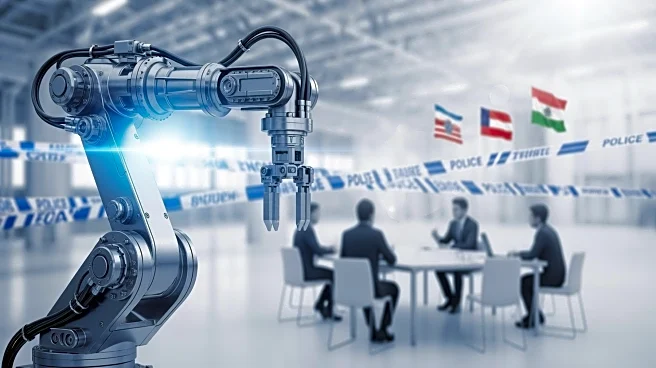What's Happening?
AI technology is increasingly automating routine engineering tasks, such as automatic dimensioning in CAD systems and predictive maintenance models. These advancements, while significant, are not equivalent
to artificial general intelligence (AGI). Current AI systems excel in solving narrow, well-defined problems but struggle with the complex reasoning required in industrial environments. The data produced in these settings is vast yet sparse, posing challenges for AI systems that rely heavily on large datasets. Historically, AI began with logic-based systems aimed at solving engineering problems, leading to modern control systems and automation logic. Despite advancements, AI systems still face limitations in handling uncertainty and integrating into real-time decision-making processes.
Why It's Important?
The integration of AI in engineering is reshaping the industry by enhancing efficiency, throughput, and emissions reduction. AI's ability to automate tasks and assist engineers in mastering complexity is driving innovation in industrial systems. However, the lack of a unifying platform that integrates data, physics, and computation in real-time remains a barrier to widespread deployment. The evolving role of engineers, augmented by AI, suggests a future where human expertise is fused with AI capabilities, rather than replaced. This transformation could lead to smarter, faster, and more resilient industrial systems, impacting job roles and industry standards.
What's Next?
Future developments in AI for engineering may focus on creating platforms that unify data, physics, and computation for real-time integration. This could enable continuous learning and optimization in industrial systems, even under imperfect conditions. As AI technology advances, it is expected to further amplify human capabilities, potentially altering the landscape of engineering jobs. Stakeholders in the industry may need to adapt to these changes by investing in AI technologies and training engineers to work alongside AI systems.
Beyond the Headlines
The ethical implications of AI in engineering include concerns about job displacement and the need for transparency in AI decision-making processes. As AI systems become more integrated into industrial environments, ensuring that they complement rather than replace human expertise will be crucial. Additionally, the development of AI systems that can reason under uncertainty and adapt to new conditions may lead to long-term shifts in engineering practices and industry standards.









